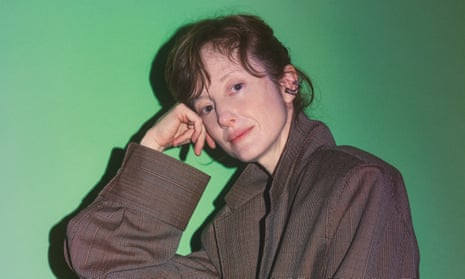Andrea Riseborough leaves great glutinous silences in a conversation, letting me hover on Zoom, half there with her in her white lounge in LA, and half simply alone and gazing. After she became famous playing Margaret Thatcher in The Long Walk to Finchley, and in the Madonna film WE as a glamorous Wallis Simpson, and as a brittle Broadway actor in the Oscar-winning Birdman, I am curious to discover that in real life Riseborough looks as if Bette Davis had perhaps joined the Clash. She is poised and mischievous as she picks through a bag of peanut butter cups for breakfast, pulling generously at a loo roll to blow her nose.
“There’s something about love stories, as they’re represented by my industry,” she’s saying, slowly, “that always ring… untrue.” We are meeting to talk about her new series, Alice & Jack, a project she’s been working on for half a decade. It’s an epic love story that plays out between Riseborough’s Alice and Domhnall Gleeson’s Jack, across 16 years. Riseborough and Gleeson have known each other almost as long and they bring a sharp intimacy to the characters who, despite their connection, struggle to be together. “What I loved about this is that they both get it so wrong, over and over, as we all do in love. It triggers something. Being in love feels like being in a constantly feral state where everything’s terrifying. You’re desperately trying to be yourself, but – you have no idea who that is any more.”
Riseborough, now 42, was born in Whitley Bay to George, a car salesman who passed on a love of cinema, and Isabel, a secretary who passed on to her daughter a love of Shakespeare “and any other writers who were dead and dusty”. She dropped out of school during her A-levels and later joined a class at Rada that included Gemma Arterton, Tom Hiddleston and Ben Whishaw. It’s been suggested since that her shapeshifting ability, the way she so wholly inhabits a role, has prevented (or, perhaps, saved) her from yet being seen as a film star. She brings a subtle edge of discomfort to her characters.
Off-screen she seems unafraid and rebellious. She appeared, for instance, on the Bafta red carpet with “Time’s Up” handwritten on her top. And on Jimmy Kimmel Live! in a hoodie that said “Equal pay”. The production company she founded is called Mother Sucker. “There is simply nobody like Andrea,” says Kate Winslet, over email. “She is kind and considerate of other actors in a way that actually makes a very real difference to those who are nervous to share the space with a heavy hitter. And to describe her as a ‘heavy hitter’ feels a little bit like saying that Tinkerbell is a heavyweight. The very unique thing is that Andrea hasn’t got a clue how powerful she is.”
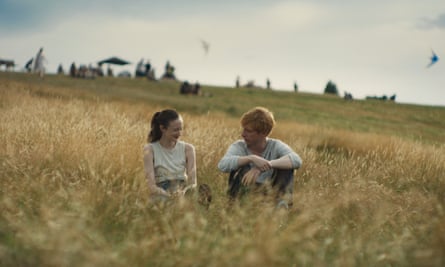
To Riseborough, her role as Alice “felt very personal”. She always feels a deep identification with her characters, but because she helped develop this series (with the writer Victor Levin), Alice felt “a little too intensely personal”. Playing somebody “in part close to yourself and part very far away is a really confusing place to be, psychologically”. In the past, she has taken breaks from acting, becoming disillusioned with the studio system. After working on Oblivion with Tom Cruise, she once said she ‘lost a sense of myself.
“She can make herself ill,” explains Winslet, “because she has zero awareness of just how deeply she can go into a role. She is gentle and sparkly, but then opens her mouth in character and ‘Wham!’ You are given an entirely alternate universe with one breath, or a small adjustment to her posture. Even her eyeballs change shape for God’s sake!”
The love story of Alice and Jack felt particularly confusing because, “It came to me six weeks after I had met the love of my life,” she says. Riseborough had just recovered from an accident – she’d broken both her legs rehearsing a stunt for drug-trafficking drama ZeroZeroZero – when she started filming Luxor, in which her character wandered through Egypt, falling in love with a man played by French-Lebanese actor Karim Saleh. On one of those wanders, the two realised they were falling for each other off camera too.
“If the script had come eight weeks before, I could not have played that part. I’m always astounded how things come together in the time of your understanding. So when this thing came, I knew exactly what it was.” One of the things her industry gets wrong with love stories, she explains, her pauses stretching like gum between us, is it only shows people who are perfect, “You know, aesthetically, internally, morally. But love is for all of us! It’s bad for all of us, and it belongs to all of us, and all of us are deserving of it.” She liked this story for its hapless stumbling, for its “unlikable” protagonists. “The big love of your life may not be a perfect-looking one. It may be two people orbiting each other, but not necessarily being able to make something that looks like a ‘conventional relationship’ work. And until people see that represented,” as it is in Alice & Jack, “they might not know that they’re craving it.”
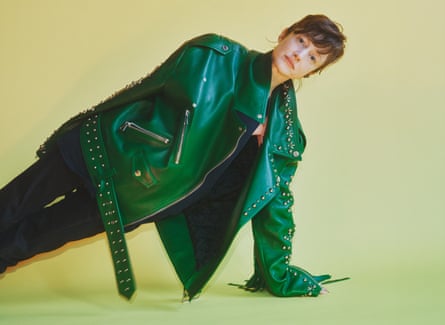
Last year, Riseborough was nominated for an Oscar, for To Leslie, a low-budget indie film about an alcoholic single mother who squanders a lottery win on booze and drugs. But what should have been a grand celebration instead unravelled into something odd and far darker. At first, Riseborough’s nomination, which came after a word-of-mouth campaign led by A-list actors such as Gwyneth Paltrow, was seen as thrilling proof that it’s not just studio-backed pictures that can score Oscar nominations.
Quickly the story changed, with the suggestion that Riseborough’s nomination came at the expense of two Black actors, Danielle Deadwyler and Viola Davis, who’d spent months campaigning for Till and The Woman King. Accusations of cronyism and white privilege surrounded Riseborough, and this appears to have crushed her, slightly. It seems clear she was scapegoated by the media, and the only scandal really uncovered was how crazy the Oscars trail really is, with the average campaign spend between $5m and $15m, and rules that become liquid when they touch cash.
It’s the first time Riseborough has done a profile interview since the controversy and today she is keen only to focus on the positives, and at an uncharacteristic speed. “I’m so grateful our film had a huge reach, a reach that none of us expected it to ever be capable of. And one of the most wonderful things about that experience was people who had been touched by alcoholism sharing their stories with us. It’s that feeling of telling a really important story, hopefully, in a way that has a measure of grace and freedom to cause such a swell of emotion.” She pauses. “I tend not to say this because I hope it’s not true. But… I don’t know whether I’ll ever have that experience again.”
What she’s most proud of, across a 20-year career, are the friendships she’s made. She talks about Mike Leigh, who directed her in Happy-Go-Lucky in 2008, and Alejandro González Iñárritu, who made Birdman, both “incredible guides through different chapters of my life”, and John Hurt, who she worked with on Brighton Rock. “He was so true to himself in spite of any noise; he was always very authentic and brilliant and funny and cynical.” That pursuit of authenticity seems particularly important to her. “Isn’t that what we’re all striving for? I do have a great amount of faith in the concept here. We respond very deeply to authenticity, don’t we? That’s the thing that unites us, because through the honesty of a story, you can see your own, no matter how different the external circumstances. But if that story is not told very well, it leads to all sorts of other things, like making false comparisons.”
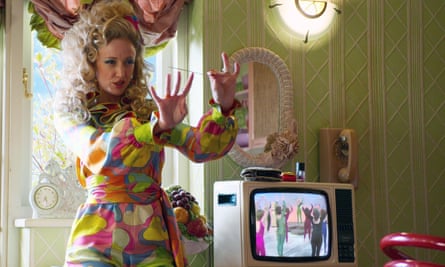
Discussing authenticity with Riseborough makes me think about a conversation I had with our stylist after her photoshoot, for which Riseborough politely declined to have her hair and makeup done, and I ask her why.
It shouldn’t be a big deal, of course, in 2024, when women have flown in space and ruled entire countries, but the fact that Andrea Riseborough is the first actor, perhaps the first woman, ever to be shot for an Observer Magazine cover without makeup on feels somehow thrilling. Was this decision part of the quest for authenticity? Was it political? Her brow briefly furrows. “No,” she says. She just wanted to use the time to, “have a laugh, instead. I was just thinking about priorities in terms of time. I love meeting people. Talking about the work that I’ve been so emotionally invested in for such a long time.”
She thinks. “When I was younger, I did ask sometimes to just have a clean face. I just wanted to be, I suppose, appreciated for some sort of ability, rather than…” Beauty? “But I’m just the worst person for saying yes to everything. Very quickly, I started wanting to please everyone and just did whatever they asked me to do for a long time. But now I’ve developed a little and you look back and you take a page out of John Hurt’s book and you learn how to speak up for yourself, and you realise, ‘Oh, I know who I am.’”
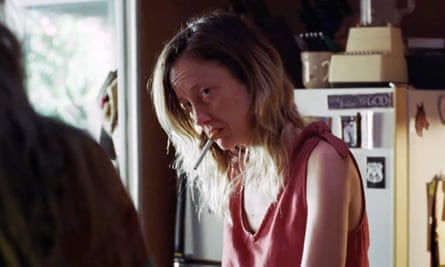
The polite refusal of makeup was one thing the stylist told me about the shoot. The other was that Riseborough had grown up with Cheryl Cole. Again, somehow thrilling. “Yes, we were really good friends when we were little. We went to dancing together, a brilliant teacher called Margaret Waite. Cheryl was an absolutely incredible classical dancer. And then I became really interested in theatre and she was more interested in music and we sort of, I suppose, grew apart.” Riseborough shrugs. “I feel like in the northeast, we’re all so closely connected. I was just watching Sarah Millican on TV the other day and thinking, oh yeah, there’s the director of the first short film I made. There aren’t that many of us. We’ve all collided.”
In 2012, Riseborough founded her production company with the aim of shining the light on underrepresented voices, “and it so happened that most of those were female or female-identified.” It sounds like it’s been equal parts enlightenment and struggle. “Joan Didion wrote something like, ‘I put the lentils on to steep, I put the baby to bed, I wrote the screenplay, and all the time, I expected a note to come through the door to tell me how to do it.’ I know that feeling, where, even if you have ample training, there’s nothing that can quite prepare you to have a real life. It’s really a case of muddling through!” She admits, though, her company is, “possibly not the most attractive model to present to people. Our motto is, ‘The last thing we want to do is grow.’” Why? “When companies really grow, they need to make choices that are creatively perhaps not in line with their original mission statement.” Which was focused on working with, “extraordinary young filmmakers.” Does she still feel young? “I feel like a baby and an old woman. The older you get and the more you see, the less you know. And you realise, what you did know was just all poppycock!”
This year, Riseborough will appear in Funny Birds, a film with Catherine Deneuve, and opposite Kate Winslet in both Lee, the biopic of Lee Miller, and the HBO series The Regime. “Just to be in a room with her is something I treasure,” says Winslet. “She’s special. Very.” When I ask Riseborough what she’s working on, however, she doesn’t tell me about the films, she tells me instead that she’s making music and “doing lots of things with her hands and, on a highbrow scale, this very much lands at the EastEnders end of things, but…” she leans in with a kind of open delight and tells me her next project is, “crocheting a Dobby.” As in, “Yes, the house elf!”
I have to ask about the pauses. I have to. They’re doing something to me: over the hour and a bit we’re talking I find myself breathing more deeply; they offer a sort of meditation. Is this how she speaks in everyday life? “I think you’d probably have to ask Karim that. I know that he gets exasperated…” What is she searching for, in the pauses? “I’m really looking for the right word to express what I’m saying. Words are so powerful. And sometimes it takes me a while to fish around. It’s funny,” she nods, “because if I’m improvising as a character there’s a different type of freedom. Their words may come very fast to them. But as myself, while I have inexhaustible amounts of energy, I think I sometimes go on low-power mode.”
What she’s trying to do, she says, in a situation like this, “is desperately attempt to forget that we’re in an interview. And to just sit as human beings across from each other and connect. It can be really difficult, as you know. But I do always think it’s good to try not to be a weirdo.” How’s that going, I ask, and she chuckles politely. “You tell me.”
Alice & Jack starts on Channel 4 on 14 February at 9pm, when all six episodes can be streamed on Channel 4 On Demand
Fashion editor Jo Jones; styling assistant Sam Deaman; photography assistants Lee Vincent Grubb, Oscar Eckel and Tilly Pearson; tailor Chandni Odedra; shot at the Roost
